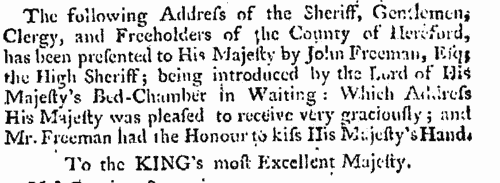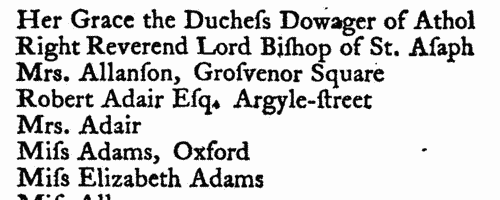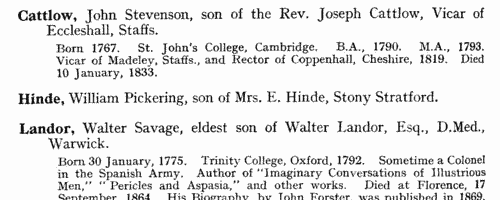Add this eBook to your basket to receive access to all 130 records. Our indexes include entries for the spelling huish. In the period you have requested, we have the following 130 records (displaying 31 to 40): These sample scans are from the original record. You will get scans of the full pages or articles where the surname you searched for has been found. Your web browser may prevent the sample windows from opening; in this case please change your browser settings to allow pop-up windows from this site.  Apprentices registered in Wells
(1769) Apprentices registered in Wells
(1769)
Apprenticeship indentures and clerks' articles were subject to a 6d or 12d per pound stamp duty: the registers of the payments usually give the master's trade, address, and occupation, and the apprentice's name, as well as details of the date and length of the apprenticeship. There are central registers for collections of the stamp duty in London, as well as returns from collectors in the provinces. These collectors generally received duty just from their own county, but sometimes from further afield. The indentures themselves can date from a year or two earlier than this return. (The sample entry shown on this scan is taken from a Durham return. Each entry has two scans, the other being the facing page with the details of the indenture, length of service, and payment of duty.) IR 1/57 | Sample scan, click to enlarge

|  Masters of apprentices registered in Exeter
(1769) Masters of apprentices registered in Exeter
(1769)
Apprenticeship indentures and clerks' articles were subject to a 6d or 12d per pound stamp duty: the registers of the payments usually give the master's trade, address, and occupation, and the apprentice's name, as well as details of the date and length of the apprenticeship. There are central registers for collections of the stamp duty in London, as well as returns from collectors in the provinces. These collectors generally received duty just from their own county, but sometimes from further afield. The indentures themselves can date from a year or two earlier than this return. (The sample entry shown on this scan is taken from a Durham return. Each entry has two scans, the other being the facing page with the details of the indenture, length of service, and payment of duty.) IR 1/57 | Sample scan, click to enlarge

|  Masters of apprentices registered in Devonshire
(1770) Masters of apprentices registered in Devonshire
(1770)
Apprenticeship indentures and clerks' articles were subject to a 6d or 12d per pound stamp duty: the registers of the payments usually give the master's trade, address, and occupation, and the apprentice's name, as well as details of the date and length of the apprenticeship. There are central registers for collections of the stamp duty in London, as well as returns from collectors in the provinces. These collectors generally received duty just from their own county, but sometimes from further afield. The indentures themselves can date from a year or two earlier than this return. (The sample entry shown on this scan is taken from a Durham return. Each entry has two scans, the other being the facing page with the details of the indenture, length of service, and payment of duty.) IR 1/57 | Sample scan, click to enlarge

|  Apprentices
(1773) Apprentices
(1773)
Apprenticeship indentures and clerks' articles were subject to a 6d or 12d per pound stamp duty (late payment of the 6d rate attracted double duty (D D) of 12d): the registers of the payments usually give the master's trade, address, and occupation, and the apprentice's name, as well as details of the date and length of the apprenticeship. 2 January to 2 November 1773 | Sample scan, click to enlarge

| Herefordshire Freeholders Deploring the American Rebellion
(1775)
In December 1775 this address of the sheriff, gentlemen, clergy and freeholders of Herefordshire was presented to king George III: 'To confirm the Liberties of Britain by the Establishment of the Legislative Powers of Parliament, our Ancestors sacrificed their Blood; and to secure those Liberties to their Posterity, transferred the Succession to the Crown to your Majesty’s Family. - To defend and maintain those Powers, we look up to your Majesty as the great Guardian of our Constitution; and permit us to assure your Majesty, that we shall chearfully concur in every Support which our Duty may call for, or our Abilities can furnish, towards the Success of your Majesty’s Arms over your rebellious Subjects; at the same Time most ardently wishing, that your Majesty’s gracious Offers of Mercy, together with the firm Support of your dutiful and loyal Subjects, may influence the Hearts of the Rebellious to return to their Duty and Allegiance; and that your whole People reunited may, with us, be convinced, that to be a British Subject, with all its Consequences, is to be the freest Member of any Civil Society in the World. And we pray to God, that your Majesty and your Progeny may long reign over these Realms in undisturbed Peace and undiminished Splendor.' The subscribers' names are given in full, christian name first. | Sample scan, click to enlarge

| Inhabitants of Bristol
(1775)
On 7 October 1775 a loyal address of the 'Mayor, Burgesses, Clergy, Freeholders, and Inhabitants of the City of Bristol', 880 in all, was presented to king George III viewing 'with Astonishment the Conduct of a few disappointed Men, whose sophistical Arguments, and seditious Correspondences, have, in a great Measure, been the Occasion of deluding your American Subjects into open Rebellion', lamenting 'the Misfortune our American Brethren have brought upon themselves', and hoping 'that the Loyalty which prevails here, will soon convince our Fellow-Subjects in America of their Error, and bring them back to a just Sense of their Duty and Allegiance'. The address was presented to the king at St James's by fourteen gentlemen on the citizens' behalf, 'Which Address His Majesty was pleased to receive very graciously: And they all had the Honour to kiss His Majesty's Hand.' | Sample scan, click to enlarge

|  Masters of apprentices registered in Bristol
(1775) Masters of apprentices registered in Bristol
(1775)
Apprenticeship indentures and clerks' articles were subject to a 6d or 12d per pound stamp duty: the registers of the payments usually give the master's trade, address, and occupation, and the apprentice's name, as well as details of the date and length of the apprenticeship. There are central registers for collections of the stamp duty in London, as well as returns from collectors in the provinces. These collectors generally received duty just from their own county, but sometimes from further afield. The indentures themselves can date from a year or two earlier than this return. (The sample entry shown on this scan is taken from a Bristol return. Each entry has two scans, the other being the facing page with the details of the indenture, length of service, and payment of duty.) IR 1/59 | Sample scan, click to enlarge

|  Masters of clerks and apprentices
(1778) Masters of clerks and apprentices
(1778)
Apprenticeship indentures and clerks' articles were subject to a 6d or 12d per pound stamp duty: the registers of the payments usually give the master's trade, address, and occupation, and the apprentice's name, as well as details of the date and length of the apprenticeship. 2 January to 25 August 1778. IR 1/29 | Sample scan, click to enlarge

| Subscribers to Ann Yearsley's Poems on Several Occasions
(1785)
This book of poetry by 'Ann Yearsley, a Milkwoman of Bristol', received great critical acclaim and was rapidly reprinted. The third edition included these subscription lists for the first two editions. | Sample scan, click to enlarge

| Boys entering Rugby School
(1786)
This edition of Rugby School Register was published in 1933: the volume covering 1675 to 1857 contains 6480 entries, based on the original school admission registers, but elaborated with general biographical information wherever the editor was able to do so. The entries for the 17th and early 18th centuries are much less detailed than those for later years. The arrangement of the fullest entries was to give the boy's full name (surname first, in bold); whether eldest, second, &c., son; father's name and address as of when the boy entered school; the boy's age at entry and birthday; name of the house (in the school) to which he belonged; then a brief general biography; and date and place of death. | Sample scan, click to enlarge

|
Research your ancestry, family history, genealogy and one-name study by direct access to original records and archives indexed by surname.
|












